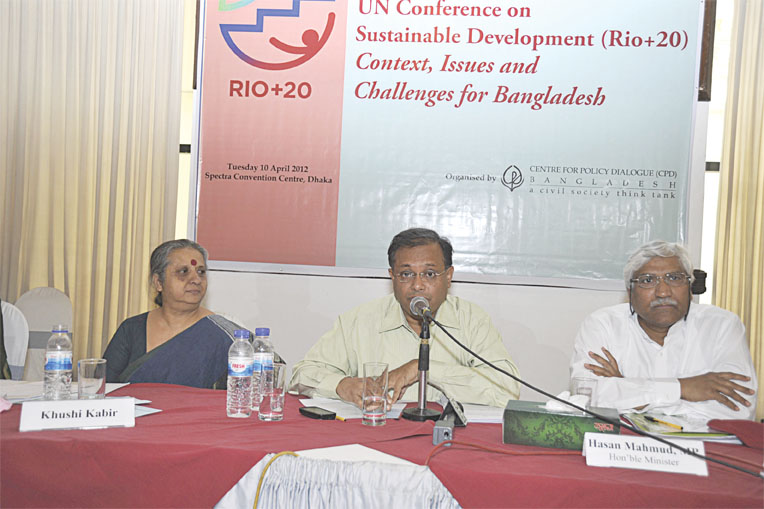Inter-ministerial coordination is necessary to take full advantage of the Rio Earth Summit, said Dr Fahmida Khatun, Head of Research, CPD at a dialogue on UN Conference on Sustainable Development (Rio+20): Context, Issues and Challenges for Bangladesh at Spectra Convention Centre on 10 April 2012. Dr Hasan Mahmud, Hon’ble Minister for Environment and Forests, was the Chief Guest and CPD’s Board of Trustee Member Ms Khushi Kabir was the Chair. Dr Qazi Kholiquzzaman Ahmad, Chairman of the Palli Karma-Sahayak Foundation (PKSF) was the Special Guest of the dialogue where Dr A Atiq Rahman, Executive Director of Bangladesh Centre for Advanced Studies (BCAS) attended as Discussant.
The panel could not stress enough how crucial the negotiations at Rio Earth Summit were to Bangladesh’s future as it is one of the most vulnerable countries to climate change effects. According to Dr Khatun, Bangladesh today faces a number of environmental concerns such as ensuring livelihood security for the people, combating environmental disasters, preventing industrial pollution, managing urbanisation and conserving biodiversity that need to be addressed at the upcoming Summit on June 20-22.
Also referred to as the Rio+20 Summit 2012 as it is a follow-up to the world conference held in Rio de Janeiro in 1992, the Summit will primarily focus on a green economy in the context of poverty eradication and sustainable development, and an institutional framework to attain that along with efforts to renew political commitment to sustainable development. Pursuing a green economy, however, has proven to be a controversial issue and may actually hinder Bangladesh’s development, said Dr Khatun.
Dr A Atiq Rahman however, opined that the Summit does not excite people regionally or globally due to its slow progress. He said, “conditionalities for the green economy are down the line that is why there is less enthusiasm about Rio Summit.”
Dr Khatun called for a thorough preparation for the Summit at the home front. She also suggested making organised plans to obtain financial and technological support that would help Bangladesh achieve sustainable development and taking a strong stance in an appeal for developed countries to commit 0.7 per cent of their GNP to official development assistance for poorer countries.
Dr Kholiquzzaman said Bangladesh had been working on preparing a country paper ensuring participation from all stakeholders in the process. He was hopeful that as Bangladesh’s aspiration has been reflected in the draft agenda of G-77, together with the concerns of the developing world it can be pursued in the conference.
Hon’ble Minister Dr Hasan Mahmud noted that Bangladesh had almost attained food security but needed to incorporate climate adaptation measures into its plans for the future to ensure sustainability. According to him, sustainable development was crucial and the necessary resources needed to be preserved for the future generation.



